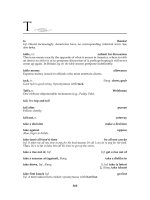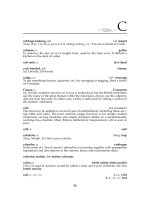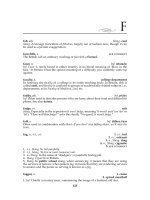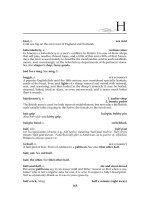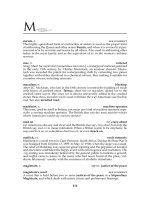British English A to Z - past 6
Bạn đang xem bản rút gọn của tài liệu. Xem và tải ngay bản đầy đủ của tài liệu tại đây (192.16 KB, 29 trang )
jack, v.t. Inf. steal
Abbr. of ‘highjack.’
jacket potato, Inf. baked potato
Jack the lad, n. Slang. see comment
A man who is independent and sly, and who looks out for himself. There might
be an implication of impropriety, but rarely enough to call for outright moral con-
demnation. Operator is an approximate American equivalent.
Jag, n. Inf. Jaguar car
jakes, n. Slang. can (privy)
Slang. Archaic word for outhouse, toilet.
jam, n. treat
Slang. A real jam is British slang for a real treat. A jam sandwich in Britain can mean
what it does in America, but it is also a term used to mean the kind of layer cake
that has preserves between the layers. See also jam sandwich.
jam, money for. See money for jam.
jam on it. See have jam on it.
jam sandwich police car
Slang. So named because the vehicles have been white with a red stripe along the
middle, suggesting jam between two slices of white bread. Cf. panda car; Z-car.
jam tomorrow, Inf. Inf. pie in the sky
Easy enough to promise jam, harder to provide it.
Janeite, n. Jane Austen fan
Sometimes spelled Janite. Not an American word, since Jane Austen is not a
national craze.
jankers, n., pl. Slang. jug
Slang. In the special sense of military jail. Jankers has other meanings in military
slang: ‘defaulters’; their ‘penalty’ or ‘punishment’; the ‘cells’ themselves. To get
ten days’ jankers is to be confined to the stockade for that period.
jaunty, n. master-at-arms
Naut. Slang. Head policeman on a naval vessel. The official title in both the Royal
Navy and the United States Navy is master-at-arms, often abbreviated to M.A.A.
J
187
h
jaw, n. talking to
Slang. A contemptuous term. A pi-jaw (pi- is short for pious) is one of those lectures
or sermons delivered by a schoolteacher or a scout leader on a man-to-man basis
to prepare the nervous youngster for life’s pitfalls. More generally, a conversation
or a meeting.
jaw-bacon. See chaw-bacon.
jaw-jaw, n., v.i. 1. endless discussion
2. drone on and on
Slang. See also jaw.
jellied eel see comment
A traditional Cockney dish, pieces of eel simmered till soft and served cold with
their cooking liquid (liquor). The liquor sets to a jelly, hence the name. Less popu-
lar now than it once was.
jelly, n. gelatin-type dessert
Jelly is used in Britain as in America, but in a British restaurant if you wanted Jell-
O or its equivalent for dessert, you would ask for jelly.
jelly-bag cap stocking cap
Inf. Jelly-bags are used for straining jelly and are made of the kind of stretchable
material associated with what Americans call stocking caps.
jemmy, n. jimmy
British burglars use jemmies; their American colleagues use jimmies. Jemmy is also
used as the British name for a dish made from sheep’s head.
Jeremiah, n. Inf. gloomy Gus
Inf. Everybody knows (or should know) that Jeremiah was a doleful prophet.
jerry, n. Inf. potty
Slang. Also called jerrycan or jerrican, a 5-gallon chamber pot. With a capital J it is
British slang for a German, or Germans collectively.
jersey, n. pullover; sweater
See also jumper; woolly.
jib, v.i. hesitate, buck
Inf. Normally applied to balking horses and in Britain, informally, to cars as well
or even to stubborn persons.
jiggered, adj. 1. Slang. pooped
2. Slang. up the creek
3. Slang. damned!
1. Slang. After a long day’s work, you’re jiggered.
2. Slang. In a tough situation, like running out of gas in the middle of the night,
you’d feel jiggered.
3. Slang. The exclamation I’m jiggered means ‘I’ll be damned’ as in Well, I’m jig-
gered—fancy meeting you here!
188
jaw
jiggery-pokery, n., Inf. Inf. hanky-panky
jim-jams, n. pl. Slang. Slang. willies
A fit of nervousness or depression.
Jimmy, dismal. See dismal Jimmy.
jink, v.t., v.i. dodge
To dodge about jerkily, to avoid being hit. Said of game birds and extended to
warplanes.
job, v.t. 1. rent (horse and carriage)
2. prod
1. The British used to job horses and carriages in the old days, the verb being
applied to both supplier and user (the way Americans use rent). Jobbing, in this
sense, described an arrangement for a specified period of time, and the supplier
was called a jobmaster.
2. Also meaning stab, though this is little used.
jobber, n. see comment
On the London Stock Exchange, there are a dozen firms that act as wholesalers
and are analogous to oddlot firms on the New York Stock Exchange, in that they
are principals, acting for their own account, rather than brokers acting only as
agents for buyer or seller.
jobbernowl, n., Inf. Slang. dope; jerk
job centre, n. see comment
A government-run employment agency.
job of work job
Inf. In the sense of work to be done.
job seeker’s allowance, n. see comment
A payment made to someone who is looking for work. It may be income-based
(depending on income and savings) or contribution-based (depending on
National Insurance contributions made while working).
jobsworth, n. Inf. see comment
A particularly bureaucratic person who would never break the rules. Derives
from the saying, It’s more than my job’s worth to do that for you.
Joe Bloggs Joe Doakes
Mr. What’s-his-name; anybody who isn’t anybody; Tom, Dick, or Harry; the man
in the street. Sometimes given as Fred Bloggs.
John Dory
See Appendix II.H.
johnny, n. Inf. guy
Slang. Usually pejorative. For the British meaning of guy, see guy.
johnny
189
John O’Groats see comment
A small town on the northeasternmost tip of Scotland. Though a tourist destina-
tion of some note, its most famous feature is the expression From Land’s End to
John O’Groats, a short way of saying: From one end of the British Isles to the other.
join, v.t. board
To join a train, ship, plane, etc. is to board it.
joiner, n. carpenter
Technically speaking, joiners in both countries, as distinct from carpenters, engage
especially in interior light carpentry (doors, shelves, etc.) and cabinet making.
The British appear often to use the terms interchangeably, but joiner is rarely
heard in ordinary American speech.
joint, n. roast
In Britain that tasty leg of lamb or roast of beef or loin of pork is known as a joint.
Popular for Sunday lunch, hence the Sunday joint.
jokes, adj. Slang. funny
jollop, n. Inf. guck
Slang. Any witches’ brew you take for whatever ails you, like patent medicines
and home remedies.
jolly, n. Slang. leatherneck
Slang. A Royal Marine. Synonymous with guffy and bullock.
jolly, adv., Inf. approx. mighty (very)
joskin, n. bumpkin
Slang. Sailors use this term to describe any lubberly hand. The exact meaning of joskin
is a man from the Norfolk area who works as a farmhand during the summer and on
trawlers in wintertime, and is therefore, presumably, a green hand on board.
josser, n., Slang. Slang. geezer
jotter, n., Inf. 1. steno pad
2. notebook
2. Also exercise book.
judder, v.i. shake
Violently and noisily. A bit of onomatopoeia, also influenced by shudder. It can
apply to anything from a jalopy to an opera singer, and is also used as a noun to
denote the phenomenon.
Judy, n. Slang. broad
Slang. An uncomplimentary word for woman, suggesting that she’s no beauty.
jug, n. pitcher
In Britain it is the milk jug or water jug which is placed on the table. Jug is also a
slang word for ‘poison’ in both countries.
juggernaut, n. large truck
Inf. Very large; short for juggernaut lorry. (See lorry.) Usually refers to an enor-
mous trailer truck (see articulated lorry). The word is related to Jagannath, an
190
John O’Groats
idol of the Hindu god Krishna that was drawn in processions on vast carts and
under whose wheels fanatics threw themselves in their ecstasy, to be crushed
to death.
juggins, n. Slang. dope; fool
Slang. Synonymous with muggins. See also git.
jumble, n. see comment
Goods sold at a jumble sale or unwanted things in the house allocated to the local
jumble sale. Can also be used loosely to mean ‘junk.’
jumble sale, n. rummage sale
jumper, n. pullover
This term is used to describe a woman’s pullover sweater. See also jersey; woolly.
jump jockey, Inf. steeplechase rider
jump leads jumper cables
jump to it, Inf. Inf. hop to it
junction box. See box.
junk worn-out rope
Old, worthless stuff, rubbish, which is called junk in America, is generally
referred to as rubbish or lumber in Britain, where junk, though now extended
to mean ‘rubbish’ generally, was long more especially a nautical term meaning
‘worn-out hawsers’ or ‘cables’ which are either discarded or picked apart for use
as caulking material or in making swabs.
just, adv. adv. right
Where an American would say, “I can’t find it now, but it was right over there,”
i.e., no farther than that, a Briton would say “ . . . just over there.” Were the Briton
to say, “ . . . right over there,” he would mean ‘ . . . way over there,’ i.e., no nearer
than that. If he said, “Drink it right up,” he would mean ‘drink it all,’ whereas an
American would mean “drink it at once, right now.”
just a tick! Inf. right with you!
Inf. See also hold on!
just going just about
Used in expressions of time of day: it’s just going twelve means it’s just about twelve,
or, practically twelve. The expressions just on and going on for are used by the Brit-
ish in the same way: it’s just on nine o’clock, or it’s going on for nine, i.e., it’s not quite
or it’s just about nine. See also gone.
just here right here
just on. See just going.
just on
191
K., n. see comment
Inf. To get one’s K. is to be knighted (see Birthday Honours).
K.C. See under take silk.
kedgeree, n. see comment
(Accent on the first or third syllable.) Composed of fish, usually smoked haddock,
cooked with rice and eggs, and other variable ingredients. The word is derived from
the Hindi word khichri. It is normally a breakfast dish, and not very common.
keel, n. 1. barge
2. 21 tons 4 cwt.
1. Type of boat used, usually to carry coal, on the Rivers Tyne, Humber, etc. Still
seen, but going out of use.
2. Weight of coal that can be carried on a keel, and still used as a wholesale coal
measure. Since a British ton is 2240 lbs. and a British cwt. (hundredweight) is 112
lbs., a keel is, in American terms, 47,488 lbs., or a sliver under 23
3
/
4
tons. See also
Appendix II.C.1.
keelie, n. Inf. tough
Slang. A Scottish term, derived from the Keelie Gang, a band of hoodlums that
terrorized the streets of Edinburgh in the early 19th century. It is applied particu-
larly to street ruffians from Glasgow and environs.
keenest prices biggest bargains
Inf. Often seen in advertisements: For keenest prices shop at So-and-So’s.
keen on Inf. enthusiastic about
The object of the enthusiasm is most likely to be sexual in nature (I’m really keen
on him), but it may be a composer, a hair style, an article of clothing, etc. Dead keen
on and mad keen on indicate mounting degrees of enthusiasm.
keep, v.t. raise
A Briton who keeps pigs is not simply having them as pets; he is in business and
in America would be said to be raising them.
keep a straight bat Inf. play fair
Inf. One of many expressions borrowed from cricket, which is itself synonymous
with fair play in the mind and idiom of a Briton.
keep cave. See cave.
keeper, n. custodian; guard
Keeper is the usual British term for a museum guard or zoo employee. To a Briton,
guard would normally invoke the image of a railroad conductor or a sentry.
K
192
h
keep obbo on Inf. keep an eye on
Slang. An obbo was an observation balloon in World War I. Keeping obbo is police-
men’s slang for surveillance.
keep one’s terms. See eat one’s terms; Inns of Court.
keep shtoom, v. Inf. keep quiet
Also spelled shtum. From the Yiddish word meaning silent or dumb. Direct bor-
rowings from Yiddish are rarer in the UK than in the United States, but this is one
that has found its way into common speech.
keep the ring. See hold the ring.
keep your eyes skinned. Inf. Inf. keep your eyes peeled
Keep your pecker up! Inf. Chin up!
Inf. In this expression, pecker means ‘spirits’ or ‘courage.’ This connotation of
pecker is probably derived from its original meaning of a ‘bird that pecks’ (e.g.,
woodpecker), and by extension that with which it pecks, i.e., its beak, which
became slang for ‘nose.’
Kendal green green woolen cloth
Coarse in texture. Takes its name from Kendal, a town in England where the cloth
was originally made.
Kentish-fire, n. see comment
Prolonged rhythmic applause to express disapproval. The expression is attrib-
uted to anti-Catholic demonstrations in Kent in the early 1800s.
Kentish man see comment
Native of the County of Kent, England, born west of the River Medway. If born
east of it, he is a man of Kent.
kerbside-crawl. see comment
Slang. Crawl is used by the British the way Americans use cruise to indicate the
slow driving of a car. Kerb-crawl describes the nasty conduct of a motorist on the
prowl for women foolish enough to accept an invitation to hop in. Gutter-crawl
is synonymous. (Kerb is spelled curb in America.)
kerfuffle, n. fuss; commotion; dither
Slang. Found also in the spellings cufuffle and gefuffle, and probably in others as
well. It is sometimes used as synonymous with shemozzle.
kettle-boy, n. tea maker
Formerly, boy employed on a construction site to keep the tea kettle going all day
long.
kettle-holder, n. pot-holder
keyless watch stem-winder
keyless watch
193
kibble, n., v.t. 1. n., mine bucket
2. v.t., grind
Kibbled wheat is cracked wheat.
kick the beam lose out
kick-up. See dust-up.
Kilkenny cats squabblers
Inf. Based on an old Irish legend about two cats who fought each other so long
and so murderously that finally there was nothing left but their tails. The figura-
tive meaning of the phrase retains reference to the audible squabbling of the cats,
rather than to their gruesome end.
King’s (Queen’s) evidence state’s evidence
In Britain, the accused cooperates with the prosecution by turning King’s or
Queen’s evidence, the phrase being determined by the sex of the sovereign at the
time. In America, the phrase is state’s evidence.
kinky, adj. 1. sexually unconventional
2. twisted; odd
3. sophisticatedly off-beat
4. Inf. cool
1. Slang. Or appealing to such tastes.
2. Slang. Peculiar; kooky.
3. Slang. As of clothes, for instance.
4. Teenage slang. Synonymous with gear and fab.
kiosk, n. 1. newsstand
2. telephone booth
kip, n., v.i. 1. rooming-house
2. room in a rooming-house
3. bed
4. sleep
Slang. The house, the room in the house, the bed in the room, the sleep in the bed;
sometimes seen in the expressions go to kip, have a kip, take a kip, or kip down, mean-
ing to ‘turn in for a night’s sleep or a nap.’
kipper, n. Inf. kid; tot
Slang. Synonymous with a like-sounding British slang word—nipper.
kirby grip n. bobby pin
Also known in Britain as hair-slide and hair grip.
kissing gate Approx. cattle gate
Kissing gates found in rural Britain are gates hung with the side away from the
hinge swinging within a V-shaped or U-shaped enclosure in such a way that
people can get through but cattle can’t. You push the gate away from the nearside
of the V or U, step into the latter, slide over to the other side, and push the gate
back. This quaint device may have acquired its romantic name because it was
the place where a swain said goodnight to his lady love, and a certain amount of
lingering was in order.
194
kibble
kiss of life 1. mouth-to-mouth resuscitation
2. boost
1. The life-saving procedure.
2. Inf. Probably modeled on the phrase kiss of death, it has acquired the meaning
of something that revitalizes or provides new hope for an ailing project, situation,
etc.
kiss your hand. See as easy as kiss your hand.
kit, n., v.t. outfit
As a noun, outfit in the sense of special dress, like skiing kit, camping kit, etc. As a
verb, outfit in the sense of equip. Sometimes lengthened to kit up.
kitchen garden family fruit and vegetable garden
kitchen towel paper towel
kith and kin friends and relations
One’s own people.
knacker, n. see comment
One who purchases animal carcasses and slaughters superannuated livestock
for rendering into various products. The plant in which this is done is called a
knackery or knacker’s yard.
knackered, adj. Slang. tuckered out
Slang A grim image, derived from the previous entry.
knave, n. jack
In playing cards. Jack is another name for this card in Britain.
knees-up, n. Inf. a party with dancing
knickers, n. pl. Inf. panties
Inf. In America knickers would be understood as short for knickerbockers, which is
the British term for plus fours, an article of wearing apparel still seen there. See
also camiknickers. To get your knickers in a twist is to get all het up about some-
thing or to make a muddle of things.
knife-and-fork tea Approx. light supper
Inf. A high tea at which meat or fish is served and a knife is required. See also
high tea; cream tea.
Knight. See K.
knighthood, n. the rank of knight
knob, n., Slang. Slang. scab (strikebreaker)
Scab is now more common.
knob, n. lump
Of butter, sugar, etc.
knob
195
knobble. See nobble.
knobs. See with knobs on!
knock, n. Slang. hit (success)
Slang. Synonymous with the British sense of bomb. But see bit of a knock.
knock, v.i. Slang. wow (impress)
Slang. To knock someone in American slang is to disparage him, but in British slang
it means to impress him greatly, i.e., to knock him dead, and is probably short for
knock for six (see six).
knock acock Inf. bowl over
Inf. To astonish, to present with the unexpected.
knocked off, adj. Inf. confused, dazed
She’s been a bit knocked off since her stroke.
knocker. See up to the knocker.
knocker, n. door to door salesman
Slang. To work on the knocker is to work from door to door. Synonymous with door-
step salesman.
knocker-up, n. 1. arouser
2. see comment
1. Inf. A person whose job is to summon sleeping railroad workers or miners to
their jobs.
2. Inf. The term is used also in political circles, to describe a party worker charged
with the function of getting out the vote.
knock for six. See six.
knocking-house, n., Slang. whorehouse
knocking shop, n. Slang. brothel
knock on Inf. turn up
Inf. To knock on for work is to turn up for work; generally applied to casual labour-
ers; an echo of the more common knock off (work), used in both countries.
knock-on effect side effect
The concomitant result, incidental consequence.
knock oneself up knock oneself out
To overdo it.
knock-out, n. 1. warm-up
2. elimination contest
1. A tennis term, synonymous with knock-up.
2. A competition involving the elimination of losers, on the way to the finals.
knock up 1. wake up by knocking
2. exhaust; wear out
3. Inf. throw together
4. earn
196
knobble
1. Inf. A respectable American male will go to great pains to avoid knocking up a
lady friend, as he understands the term, because in his country it is an indelicate
expression for getting a lady into a delicate condition. In Britain, knocking people
up means waking them up by knocking on their door.
2. Inf. Another common British usage to be avoided in America: I’m quite knocked
up, or He does knock me up. This refers merely to exhaustion, physical or emo-
tional.
3. Inf. An unrelated British meaning is ‘throw together,’ as in, Don’t stand on cer-
emony, come along, we can always knock something up, referring to the preparation of
an impromptu meal. This usage was originally American, but is now exclusively
British.
4. Inf. Rare. As in, He knocks up twenty thousand quid a year, I’ll be bound.
knock-up, n. warm-up
Tennis term, synonymous with knock-out, 1.
know the form, Inf. Inf. have the inside dope
knuckle duster brass knuckles
K.O. kickoff
Inf. A British football abbreviation. Thus, on a poster advertising a football game,
“K.O. 3:00 p.m.” It also means ‘knockout,’ a boxing term, as in America.
K.O.
197


